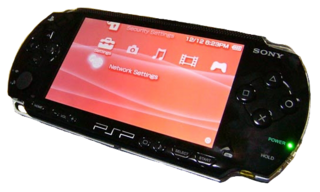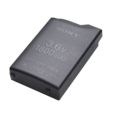PlayStation Portable
From Sega Retro

| ||||||||||||||||||||||||||||||

| ||||||||||||||||||||||||||||||
| PlayStation Portable | ||||||||||||||||||||||||||||||
|---|---|---|---|---|---|---|---|---|---|---|---|---|---|---|---|---|---|---|---|---|---|---|---|---|---|---|---|---|---|---|
| Manufacturer: Sony Computer Entertainment | ||||||||||||||||||||||||||||||
| Variants: PSP Go, PSP Street | ||||||||||||||||||||||||||||||
|
The PlayStation Portable (プレイステーションポータブル) (officially abbreviated as PSP) is a handheld video game console released by Sony Computer Entertainment in late 2004. It stands as Sony's first foray into the handheld video game market, something traditionally dominated by Nintendo. It was succeeded by the PlayStation Vita in late 2011.
Contents
Overview
The PlayStation Portable was marketed as being a handheld capable of playing "home console quality" games - technically superior to the Game Boy Advance and Nintendo DS but slightly less capable than a PlayStation 2. Though the console generated a significant amount of buzz upon release, the PSP spent most of its existence trailing behind Nintendo for one reason or another.
Multiple variants of the PSP exist, the most significant being the download-only PSP Go, released in 2009 (which ultimately failed to generate much interest). The system uses a proprietary disc format known as "Universal Media Disc" or UMD - the first handheld to opt for discs over cartridges, and often cited as one of the PSP's most significant failings due to the added load times and unreliability of the format.
Though sales were relatively strong for the PSP, the console began to lose ground to the Nintendo DS during its first two years of service, and remained in a distant second in most regions of the world. In Japan and other Asian regions, PSP sales frequently outperformed other systems due to the popularity of games such as the Monster Hunter franchise, but in the west the PSP (like its successor, the Vita), is cited for having two few truly unique games to take advantage of the hardware - much of the output from developers and publishers involved watered-down console games or spin-offs, leading to claims of an unoriginal library.
Sega Support
Sega supported the PlayStation Portable upon release, publishing more than fifty games for the handheld. Like other publishers, Sega chose to stock the PSP with games that could also be found on other systems, but although much of the library is not exclusive to the console, more games were published by the company than for the Nintendo DS.
Though Sega published a variety of games for the handheld, including After Burner: Black Falcon, Crazy Taxi: Fare Wars and Crush, in the latter years much of the company's output involved RPGs such as 7th Dragon 2020, Phantasy Star Portable (and its sequels), Valkyria Chronicles II and two Shining games; Shining Blade and Shining Hearts, most of which were made exclusive to the Japanese and Asian markets.
Perhaps one of Sega's biggest successes on the platform was the 2010 release of Hatsune Miku: Project DIVA, which spawned an entire franchise in the years which followed. Sega dropped the platform in 2011 in favor of the next generation of handhelds.
Lists of games
- 7th Dragon 2020 (2011)
- 7th Dragon 2020-II (2013)
- After Burner: Black Falcon (2007)
- Alien Syndrome (2007)
- Crazy Taxi: Fare Wars (2007)
- Crush (2007)
- Double Rivals Attack Pack! (2011)
- Double Super Hero Pack! (2011)
- Football Manager Handheld (2006)
- Football Manager Handheld 2007 (2006)
- Football Manager Handheld 2008 (2007)
- Football Manager Handheld 2009 (2008)
- Football Manager Handheld 2010 (2009)
- Football Manager Handheld 2011 (2010)
- Football Manager Handheld 2012 (2011)
- Football Manager Handheld 2013 (2012)
- Full Auto 2: Battlelines (2007)
- Garnet Chronicle: Kouki no Maseki (2008)
- The Golden Compass (2007)
- Guilty Gear XX Reload (2005)
- Hatsune Miku: Project DIVA (2009)
- Hatsune Miku: Project DIVA 2nd (2010)
- Hatsune Miku: Project DIVA Extend (2011)
- Initial D: Street Stage (2006)
- Iron Man (2008)
- Iron Man 2 (2010)
- J.League Pro Soccer Club o Tsukurou! 6: Pride of J (2009)
- J.League Pro Soccer Club o Tsukurou! 7: Euro Plus (2011)
- J.League Pro Soccer Club o Tsukurou! 8: Euro Plus (2013)
- Jissen Pachi-Slot Hisshouhou! Aladdin 2 Evolution Portable (2006)
- Jissen Pachi-Slot Hisshouhou! Hokuto no Ken Portable (2005)
- Jissen Pachi-Slot Hisshouhou! Hokuto no Ken SE Portable (2006)
- Jukugon (2006)
- K-On! Houkago Live!! (2010)
- Kamaitachi no Yoru 2 Tokubetsu Hen (2006)
- Kaze no Oka Kouen nite (2016)
- Kumitate Battle Kuttu Ketto (2016)
- Kurohyou 2: Ryu ga Gotoku Ashura Hen (2012)
- Kurohyou: Ryu ga Gotoku Shinshou (2010)
- Kyouto Daigaku Atsuji Tetsuji Kyouju Kansyuu: Zaidanhoujin Nihon Kanjinouryoku Kentei Kyoukai Kyouryoku: Kanji Trainer Portable (2006)
- Kyuutenkai (2016)
- Machi: Unmei no Kousaten Tokubetsu Hen (2006)
- Mind Quiz (2006)
- Mite Kiite Nou de Kanjite Crossword Tengoku (2007)
- My Garden (2016)
- Myst (2006)
- Neorude (2016)
- Neorude 2 (2016)
- Neorude: Kizamareta Monshou (2016)
- Omise de Tenshu (2016)
- Ore no Dungeon (2006)
- OutRun 2006: Coast 2 Coast (2006)
- Phantasy Star Defender's Pack! (2011)
- Phantasy Star Portable (2008)
- Phantasy Star Portable 2 (2009)
- Phantasy Star Portable 2 Infinity (2011)
- Phantasy Star Portable 2 Infinity Special Taikenban (2011)
- Phantasy Star Portable 2 Special Taikenban (2009)
- Phantasy Star Portable Special Taikenban (2008)
- Planetarium Creator Ohira Takayuki Kanshuu Homestar Portable (2006)
- Puyo Pop Fever (2004)
- Puyo Puyo 7 (2009)
- Puyo Puyo Fever 2 (2005)
- Puyo Puyo Sun (2014)
- Puyo Puyo! (2007)
- Puyo Puyo!! (2011)
- Reverthion (2016)
- Sakura Taisen 1 & 2 (2006)
- Sega Fun Pack: Sonic Rivals 2 & Sega Genesis Collection (2009)
- Sega Mega Drive Collection (2006)
- Sega Rally Revo (2007)
- Senjou no Valkyria 3 (2011)
- Senjou no Valkyria 3 Extra Edition (2011)
- Shining Ark (2013)
- Shining Blade (2012)
- Shining Hearts (2010)
- Sonic Rivals (2006)
- Sonic Rivals 2 (2007)
- Sony Computer Science Kenkyujo Mogi Kenitirou Hakusi Kansyuu: Nou ni Kaikan Aha Taiken! (2006)
- Sony Computer Science Kenkyujo Mogi Kenitirou Hakusi Kansyuu: Nou ni Kaikan Minna de Aha Taiken! (2006)
- Steeldom (2016)
- Super Monkey Ball Adventure (2006)
- Tenchu: Time of the Assassins (2006)
- Thunder Force V: Perfect System (2016)
- Touhoku Daigaku Mirai Kagaku Gijutsu Kyoudou Kenkyuu Center Kawashima Ryuuta Kyouju Kanshuu: Nouryoku Trainer Portable (2005)
- Valkyria Chronicles II (2009)
- Virtua Tennis 3 (2007)
- Virtua Tennis: World Tour (2005)
- World Snooker Championship 2005 (2005)
- World Snooker Championship 2007 (2007)
By region
- List of PlayStation Portable games in Australia
- List of PlayStation Portable games in Brazil
- List of PlayStation Portable games in Canada
- List of PlayStation Portable games in France
- List of PlayStation Portable games in Germany
- List of PlayStation Portable games in Italy
- List of PlayStation Portable games in Japan
- List of PlayStation Portable games in Mexico
- List of PlayStation Portable games in Russia
- List of PlayStation Portable games in South Korea
- List of PlayStation Portable games in Spain
- List of PlayStation Portable games in Taiwan
- List of PlayStation Portable games in the United Kingdom
- List of PlayStation Portable games in the United States
Photo gallery
PlayStation Portable console, Hatsune Miku: Project DIVA 2nd model
Promotional images
PSP-1000
PSP-2000
PSP-3000
PSP Go
PSP Street
References
- ↑ 1.0 1.1 http://www.scei.co.jp/corporate/data/bizdatajpn_e.html (Wayback Machine: 2006-09-08 01:52)
- ↑ http://www.scei.co.jp/corporate/data/bizdatausa_e.html (Wayback Machine: 2006-09-17 14:14)
- ↑ http://www.scei.co.jp/corporate/data/bizdataeu_e.html (Wayback Machine: 2006-08-19 07:44)
- ↑ http://www.scei.co.jp/corporate/data/bizdataasia_e.html (Wayback Machine: 2006-08-19 07:47)
| Non-Sega consoles |
|---|
| Nintendo |
| Nintendo Entertainment System (1983) | Game Boy (1989) | Super Nintendo Entertainment System (1990) | Nintendo 64 (1996) | Game Boy Color (1998) | Game Boy Advance (2001) | Nintendo GameCube (2001) | Nintendo DS (2004) | Wii (2006) | Nintendo 3DS (2011) | Wii U (2012) | Nintendo Switch (2017) |
| Sony |
| PlayStation (1994) | PlayStation 2 (2000) | PlayStation Portable (2004) | PlayStation 3 (2006) | PlayStation Vita (2011) | PlayStation 4 (2013) | PlayStation 5 (2020) |
| Microsoft |
| Xbox (2001) | Xbox 360 (2005) | Xbox One (2013) | Xbox Series X (2020) |
| Mobile |
| iOS | Android | Windows Phone |
| Other |
| Atari 2600 (1977) | Intellivision (1979) | ColecoVision (1982) | Atari 5200 (1982) | PC Engine (1987) | CD-ROM² (1988) | Super CD-ROM² (1991) | R-Zone (1995) | Game.com (1997) | WonderSwan (1999) | Neo Geo Pocket Color (1999) | N-Gage (2003) | LeapFrog Didj (2008) | Stadia (2019) |































































